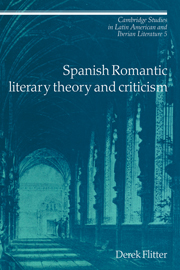Book contents
- Frontmatter
- Contents
- Preface
- List of abbreviations
- Introduction
- 1 Böhl von Faber and the establishment of a traditionalist Romanticism
- 2 The consolidation of Romantic ideas: 1820–1833
- 3 The exiles, liberal Romanticism and developments in criticism
- 4 Condemnation and clarification in the literary debate
- 5 Reaffirmation of Schlegelian principles in literary criticism
- 6 The religious spirit in literary ideas and the influence of Chateaubriand
- 7 The perception of literature's rôle in society
- 8 Romantic traditionalism in the work of Fernán Caballero
- 9 Conclusions: The mid-century
- Notes
- Bibliography
- Index
3 - The exiles, liberal Romanticism and developments in criticism
Published online by Cambridge University Press: 02 November 2009
- Frontmatter
- Contents
- Preface
- List of abbreviations
- Introduction
- 1 Böhl von Faber and the establishment of a traditionalist Romanticism
- 2 The consolidation of Romantic ideas: 1820–1833
- 3 The exiles, liberal Romanticism and developments in criticism
- 4 Condemnation and clarification in the literary debate
- 5 Reaffirmation of Schlegelian principles in literary criticism
- 6 The religious spirit in literary ideas and the influence of Chateaubriand
- 7 The perception of literature's rôle in society
- 8 Romantic traditionalism in the work of Fernán Caballero
- 9 Conclusions: The mid-century
- Notes
- Bibliography
- Index
Summary
The historical Romanticism that gained ground during the reign of Ferdinand VII can only in part explain the literary events of 1834 and 1835. The background to the emergence of plays like La conjuratión de Venecia and Don Alvaro, and poetry like the Canciones of Espronceda, is to be found in the experiences of the political exiles in England and France. Martinez de la Rosa and the Duque de Rivas wrote their respective dramas for French audiences accustomed to the dramatic spectacle of works like Hugo's Hernani and Dumas pere's Antony. Espronceda, meanwhile, had seen at first hand the street barricades of the July Revolution of 1830, and had formed part of Joaquin de Pablo's abortive attempt to restore constitutional government in Spain, a subject he was to commemorate in an effusive poem. In this respect, Alfonso Par, as early as 1935, shrewdly indicated the divergent characteristics of these two types of Spanish Romanticism. Par observed that the movement's early phase owed its inspiration to Germany; the returning political exiles brought with them very different elements pertaining to what he described as a ‘second Romantic phase’.
Statements on literature and aesthetics made by the exiled Spanish writers are illuminating. Firstly, the enthusiasm for early Spanish literature displayed by Jose Joaquin de Mora during his residence in London appears striking, not least since he was to make a number of assertions and comments that openly conflict with his previous position in the polemic with Böhl.
- Type
- Chapter
- Information
- Spanish Romantic Literary Theory and Criticism , pp. 50 - 75Publisher: Cambridge University PressPrint publication year: 1991



